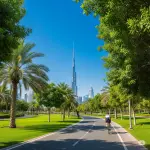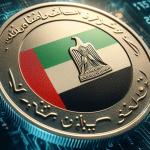Dubai, a name often conjuring images of towering skyscrapers, opulent hotels, and vast shopping malls, might not immediately bring to mind a bustling tech hub. Yet, beneath its shimmering facade and beyond its famed luxury, this desert city has quietly, yet strategically, cultivated one of the most dynamic and rapidly growing technology ecosystems in the world. The journey from "Sand to Silicon" is a remarkable testament to visionary leadership, bold economic diversification, and an unwavering commitment to the future.
This transformation didn't happen by accident. It's the result of a deliberate, multi-pronged strategy initiated decades ago to move beyond an oil-dependent economy and embrace the knowledge-based industries of the 21st century. Today, Dubai stands as a magnet for global tech giants, ambitious startups, and top-tier talent, truly earning its place on the global technology map.
The Visionary Seeds: Diversifying Beyond Oil
The genesis of Dubai's tech ambition can be traced back to the foresight of its leadership, particularly His Highness Sheikh Mohammed bin Rashid Al Maktoum, Vice President and Prime Minister of the UAE and Ruler of Dubai. Recognizing the finite nature of oil reserves, a strategic decision was made in the late 20th century to diversify the economy. The focus shifted towards becoming a global hub for trade, tourism, finance, and crucially, knowledge and technology.
This vision was not merely aspirational; it was accompanied by concrete plans and aggressive execution. The idea was to create an environment so conducive to business and innovation that it would naturally attract the world’s brightest minds and most dynamic companies, regardless of its desert location. This early clarity of purpose laid the groundwork for an unprecedented economic metamorphosis.
The Cornerstone: Specialised Free Zones
A cornerstone of Dubai's strategy was the establishment of specialized free zones. These economic areas offer foreign investors 100% ownership, repatriation of capital and profits, and exemptions from corporate and personal income taxes (for extended periods, often 50 years guaranteed by law). This competitive advantage was designed to overcome initial hesitations about operating in a relatively new market.
- Dubai Internet City (DIC): The Pioneer: Launched in 1999 and opened its doors in October 2000, Dubai Internet City was the trailblazer. It was conceived with the explicit vision of making Dubai an Information Communication Technology (ICT) hub. DIC quickly attracted global tech giants like Microsoft, IBM, Cisco, Oracle, Dell, Google, and Meta, providing them with world-class infrastructure, connectivity, and a supportive regulatory environment. By clustering these companies, DIC fostered an ecosystem where collaboration, talent exchange, and innovation could flourish. It became the regional base for many of the world's leading IT companies, sparking research, development, and a significant increase in IT sector employment.
- Dubai Silicon Oasis (DSO): The Innovation Ecosystem: Established in 2003, Dubai Silicon Oasis was designed as a free zone technology park that goes beyond just office spaces. It aimed to be a holistic ecosystem for technological innovation and advanced industries. DSO provides state-of-the-art infrastructure, high-speed internet, R&D facilities, and a range of business support services from licensing to mentorship and funding access. It actively fosters startups and SMEs, focusing on cutting-edge fields like advanced manufacturing, blockchain, artificial intelligence, and robotics. DSO also integrates residential, commercial, and recreational facilities, creating a self-sustaining community for tech professionals.
- Complementary Free Zones: Beyond DIC and DSO, other specialized free zones like Dubai Media City, Dubai Knowledge Park, and the DIFC Innovation Hub (focused on Fintech and AI/Web3) further diversify the tech landscape. Each caters to specific niches, creating a rich tapestry of interconnected digital industries. For example, DIFC's AI & Web3 Campus aims to house over 500 AI and Web3 firms, creating thousands of jobs by 2028, showcasing the granular focus on emerging technologies.
The Driving Force: Unwavering Government Support and Initiatives
Dubai's tech ascent is not just about attractive free zones; it's deeply rooted in proactive government support and strategic initiatives that actively nurture innovation.
- Dubai Future Foundation (DFF): A pivotal entity, DFF is dedicated to exploring and shaping the future. It launches programs like the Dubai Future Accelerators, a zero-equity initiative that connects startups with government entities to co-create solutions for future challenges in areas like AI, blockchain, and smart services. DFF also leads initiatives like the Human-Machine Collaboration (HMC) Icons, a classification system to differentiate human and AI contributions in content creation, demonstrating a commitment to shaping ethical AI use globally.
- Smart Dubai and Dubai 10X: These initiatives have been instrumental in transforming Dubai into a truly "smart city," leveraging technology to enhance government services, urban infrastructure, and overall quality of life. The "Dubai 10X" initiative pushes government entities to rethink their operations and implement innovative solutions that are 10 years ahead of other cities. This top-down mandate for innovation creates a fertile ground for tech companies providing smart city solutions.
- Funding and Regulatory Sandbox: Government-linked funds and entities (like Mubadala, a sovereign wealth fund) invest significantly in tech startups and scale-ups. Additionally, regulatory sandboxes, particularly in fintech (e.g., DIFC FinTech Hive), allow startups to test innovative solutions in a live, controlled environment, fostering rapid development and regulatory clarity. The recent shift to allow 100% foreign ownership in many onshore activities, beyond just free zones, further streamlines business setup.
The Human Element: Attracting and Nurturing Talent
A tech hub is only as good as its talent pool. Recognizing this, Dubai has implemented aggressive strategies to attract and retain skilled professionals from across the globe.
- The Golden Visa Program: This long-term residency visa, initially designed for investors, has significantly expanded its scope to explicitly target specialized talent in critical sectors like AI, climate tech, cloud computing, and advanced digital technologies. It offers up to 10 years of residency, freedom from a single employer, and flexibility for entrepreneurs, making it highly attractive for senior global talent seeking stability and career mobility. Data from 2023 shows a significant shift, with 60% of Golden Visa recipients coming from high-value categories beyond just investors, emphasizing the focus on skills over capital.
- World-Class Education Infrastructure: Dubai hosts numerous international university branch campuses (e.g., Rochester Institute of Technology, NYU Abu Dhabi, Heriot-Watt University) and local institutions like the Mohamed bin Zayed University of Artificial Intelligence (MBZUAI), the world's first graduate-level, research-based AI university. These institutions are crucial for developing a local pipeline of highly skilled graduates in cutting-edge fields, reducing reliance on imported talent in the long run.
- Multicultural Environment and Quality of Life: Dubai's diverse, cosmopolitan environment, coupled with high safety standards, world-class infrastructure, and a tax-free income, serves as a powerful magnet for talent. Professionals from Asia, Europe, and North America work side-by-side, fostering cross-cultural collaboration and a unique global perspective that is invaluable for building globally scalable tech products. The high quality of life, leisure options, and excellent connectivity further enhance its appeal.
Key Pillars of Growth: Focus Sectors and Infrastructure
Dubai hasn't just built a general tech hub; it has strategically cultivated specific sectors where it can leverage its strengths and future-proof its economy.
- Fintech: Leveraging its strong financial services sector (DIFC), Dubai has emerged as a leading Fintech hub, attracting startups and major players in digital payments, blockchain banking, and wealth management.
- AI and Metaverse: With dedicated strategies and a clear vision for integrating AI into government services and the economy, Dubai is becoming a hotbed for AI development. The Dubai Metaverse Strategy aims to create 40,000 virtual economy jobs and contribute $4 billion to GDP by 2030, underscoring its futuristic ambitions.
- E-commerce and Logistics Tech: Building on its historical role as a trade hub, Dubai is a natural fit for e-commerce innovation, with successful regional giants like Souq.com (acquired by Amazon) and Noon. Logistics tech, leveraging its world-class ports and airports, is also a significant growth area.
- HealthTech and EdTech: With significant government investment in healthcare and education, these sectors are rapidly digitizing, creating opportunities for tech solutions in telemedicine, AI-driven diagnostics, and interactive learning platforms.
Underpinning all this is world-class digital infrastructure. High-speed internet, advanced data centers (like Khazna's expansion in DIC), and robust cybersecurity measures provide the essential backbone for a thriving digital economy.
Overcoming Challenges: A Continuous Evolution
Building a tech hub from scratch in a desert climate was not without its hurdles. Initial skepticism from international markets, the challenge of cultivating a local talent pool, and intense global competition were significant barriers. However, Dubai's agile policy-making, consistent investment, and relentless pursuit of excellence have steadily overcome these. The continuous evolution of visa regulations, business setup processes, and funding mechanisms demonstrates a responsive ecosystem.
Conclusion: Dubai's Unstoppable Digital Ascent
From barren sands to a burgeoning silicon landscape, Dubai's transformation into a global tech hub is a modern economic miracle. It's a powerful narrative that challenges conventional wisdom, proving that with visionary leadership and strategic execution, any city, regardless of its geographical constraints, can become a beacon of innovation.
Dubai's journey is far from over. With ambitious targets for AI integration, metaverse development, green tech, and attracting an ever-growing pool of global talent, the city is not just adapting to the digital future; it is actively shaping it. The "Sand to Silicon" story is a testament to Dubai's enduring belief that the true wealth of a nation lies not beneath its ground, but within the boundless potential of human ingenuity and technological advancement. It serves as an inspiring blueprint for how bold vision can turn the most improbable dreams into tangible realities.










